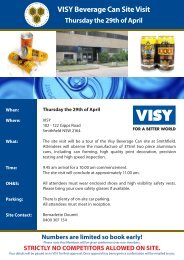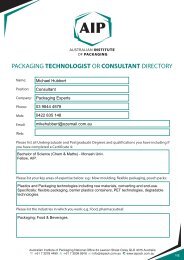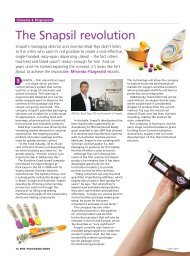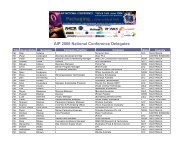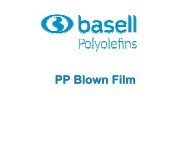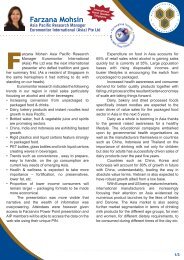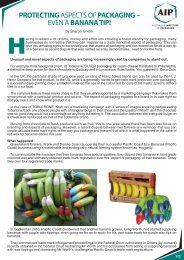Slip-Slop-Slap - Australian Institute of Packaging
Slip-Slop-Slap - Australian Institute of Packaging
Slip-Slop-Slap - Australian Institute of Packaging
You also want an ePaper? Increase the reach of your titles
YUMPU automatically turns print PDFs into web optimized ePapers that Google loves.
<strong>Slip</strong>-<strong>Slop</strong>-<strong>Slap</strong><br />
by Michael B Halley FAIP<br />
It was not a presentation on skin cancer at<br />
the May meeting <strong>of</strong> <strong>Australian</strong> <strong>Institute</strong> <strong>of</strong><br />
<strong>Packaging</strong> in Melbourne, but a forum on<br />
additives in plastic packaging and ink for<br />
packaging applications.<br />
But it could have been for the messages received<br />
were closely aligned to those given about protection<br />
from the sun. Debra Watkins Business Manager<br />
<strong>of</strong> Croda Australia and Angelo Spano National<br />
Segment Manager Liquid Inks at FlintGroup walked<br />
us through the <strong>of</strong>ten highly technical but very<br />
interesting fields <strong>of</strong> their industry.<br />
Debra enlightened us about the role <strong>of</strong> additives in plastic packaging that are formulated to increase the<br />
functionality <strong>of</strong> the material being converted. Almost always supported by a Masterbatch additives can<br />
modify the friction in rolls <strong>of</strong> film, assist in mold release and provide UV protection. (More or less <strong>Slip</strong><br />
<strong>Slop</strong> <strong>Slap</strong>)<br />
Additives supplied by Croda are influenced by the company’s global reach and are formulated to assist<br />
and enhance:-<br />
• Friction Modification<br />
• Mold release<br />
• Torque release<br />
• Scratch and Scuff resistance<br />
• Anti-block<br />
• Anti-stat<br />
• Anti-fog<br />
• Pigment & Filler dispersion<br />
• Polymer flow improvement<br />
• De-nesting<br />
• UV Absorption –Colour and Vitamin Retention<br />
The additives migrate to the surface <strong>of</strong> the liquid plastic material and provide the enhancement.<br />
Examples are friction modification to allow rolls <strong>of</strong> film or plastic bags to unwind without sticking,<br />
reducing the adhesion <strong>of</strong> things such as small plastic bags in produce sales areas and reducing the static<br />
electricity built up during processing.<br />
For all polymers, (even bio) there is a specific additive for optimum result. Brochures supplied asked: -<br />
• Could you benefit from a slip additive that decreases friction and mold release in your PET<br />
manufacturing process?<br />
• Are high surface friction and poor mold release holding your polystyrene manufacturing back?<br />
• Would you like to make more money from your injection moulding process?<br />
Answers to the questions are contained in the range <strong>of</strong> Croda products and some examples <strong>of</strong> additives<br />
for the lesser used or developing polymers were supplied. A series <strong>of</strong> technical slides really grabbed<br />
attention and led to a question session <strong>of</strong> unprecedented length.<br />
1/2
<strong>Slip</strong>-<strong>Slop</strong>-<strong>Slap</strong><br />
by Michael B Halley FAIP<br />
The additive (Solarsorb) specifically formulated to give UV protection in both film and bottle packaging<br />
has been found to reduce the vitamin A loss in milk by nearly 40% over a four day test. Milk tested was<br />
filled into a HDPE (500μm wall thickness) and left under fluorescent light similar to the environment in a<br />
dairy case at your local supermarket.<br />
Angelo Spano modified the advertised topic to one that more generally addressed the packaging<br />
industry and took a journey <strong>of</strong> ink from research to end user. Liquid inks have many applications for<br />
flexography or gravure printing on packages across all segments <strong>of</strong> the packaged product spectrum.<br />
The presentation started with the question: What is Ink? and moved through an overview <strong>of</strong> compliance,<br />
application, correct ink choice and technologies for the future. The definition <strong>of</strong> ink as “a liquid or<br />
paste containing various pigments and colorants used to produce markings” leaves much scope for<br />
interpretation when trying to choose the correct ink for an application. Angelo advised the best solution is<br />
to ask some fairly straightforward but basic questions. By walking customers through the journey above<br />
(research to end user) it has been found that the correct choice <strong>of</strong> ink can be established if answers<br />
to basics are provided. Does it comply with the needs? Has it the ability to achieve all requirements?<br />
Can the press used meet the conditions expected? Are the technology directions compatible? These are<br />
some <strong>of</strong> the questions that would be considered essential.<br />
To ensure the various levels <strong>of</strong> compliance, all products have a material data safety sheet (MSDS) to<br />
assist selection and ensure legal compliance. Ink manufacturers are conscious that their products are<br />
a part <strong>of</strong> the overall environmental solution. Words like resin and solvents can be seized upon to wrong<br />
effect so much research is being done to eliminate conjecture. Flint has undertaken extensive research<br />
globally to explore environmentally friendly products and the results are remarkable. Inks are constantly<br />
changing to meet ever changing demands and establish ‘green credentials’.<br />
Market drivers for ink are no different than any other product used in packaging. Converters, retailers and<br />
the consumer are the catalysts for change and there is no doubt that all are conscious <strong>of</strong> environmental<br />
drivers.<br />
So whether it be an additive for plastic resin or ink for glamorising a package it is important to work<br />
toward commercial and environmental outcomes. The presenters fielded many questions with<br />
pr<strong>of</strong>essionalism and left the assembly in no doubt that they know their stuff.<br />
Ralph Moyle the Southern Branch Chairman thanked Debra and Angelo and gifted them with a present<br />
that encompassed both plastics packaging and printing inks.<br />
More information can be found on the company web sites www.ip.flitgrp.com and www.croda.com.au or<br />
email dwatkins@croda.com.au and angelo.spano@ip.flintgrp.com<br />
Michael B Halley FAIP<br />
<strong>Australian</strong> <strong>Institute</strong> <strong>of</strong> <strong>Packaging</strong><br />
www.aipack.com.au<br />
2/2



